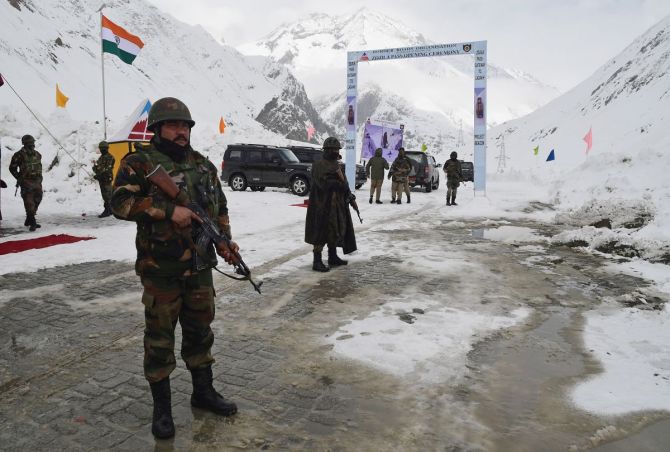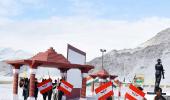'The India-China relationship has deteriorated greatly over these past two years and it is set to deteriorate further.'

"All those agreements aimed at maintaining peace and tranquility in the India-China border areas have become redundant the moment China moved large numbers of troops to Eastern Ladakh in May 2020," says Gautam Bambawale, India's former ambassador to China.
In an e-mail interview with Rediff.com's Archana Masih, the diplomat-thinker -- who was India's ambassador to China during the 2018 Modi-Xi summit in Wuhan -- warns that India should not expect a breakthrough in Ladakh soon and should stick to its position through thick or thin.
The concluding segment of a must-read interview:
Would you agree that the Chinese actions in Ladakh have made most of the post 1990 agreements on maintaining peace and harmony along the Line of Actual Control redundant? Will India-China relations stay in a limbo for the next 20 years at last? What will it take for India to trust China again?
Yes indeed -- all those agreements aimed at maintaining peace and tranquility in the India- China border areas have become redundant the moment China moved large numbers of troops to Eastern Ladakh in May 2020.
The reason is that all these agreements stated in their preambular portions that there will be no sudden or large scale troop movements without notifying the other side.
Obviously, this was not done. So China violated those agreements. Hence, they are null and void.
There is no question of trusting China. Now we know that they will also not hesitate to violate bilateral accords and agreements signed in public by their own leaders.
So India will have to start from these premises in its relations with China. Yes, I think the India-China relationship has deteriorated greatly over these past two years and it is set to deteriorate further.
That is the reality, as I see it. We must proceed from there. Let us not delude ourselves of improving the situation. It cannot be one sided. Both sides must want an improvement in the situation.
Can we expect Chinese military adventurism all along the LAC -- opening up fresh fronts in the Pithoragarh sector in Uttarakhand, for instance -- compelling the India military to be on its guard always?
We would be foolish not to prepare for it. Also, we cannot always be waiting for them to move. We can make some well thought moves of our own, which will keep them off balance.
Do you think Prime Minister Modi was ill advised to invest so much in the China relationship, an investment that failed? Would you compare his outreach to China as much as an error of judgment as Mr Nehru's was in the 1950s?
It is not just Prime Minister Modi, but many previous prime ministers and many previous governments which have invested in the relationship.
They were not wrong in investing in the relationship. It did give us three decades of relative peace on our borders.
The mistake we in India may have made is not to pay attention to the ever increasing gap between Indian power and Chinese power.
This gap or differential has enabled China to make the current moves on the border and not baulk at violating bilateral agreements.
We need to narrow this gap in power between India and China. We have to grow our economy by 8 per cent per annum over a 20 year period.
What does India need to do in the short and long term to stand up to China, to ensure that it will not dare to do what it has done in Ladakh and earlier?
In the long term as I have enunciated earlier, we have to grow our economy by 8 per cent per annum for a 20-year period. This will narrow the power differential between India and China.
Remember, with economic growth and development comes more military muscle, better technologies, more indigenously manufactured military hardware.
We have to grow our comprehensive national power and reduce this huge gap which has opened up vis-a-vis China. That is in the long term.
In the short term we need to use mechanism like the Quad, our strategic partnerships with the great democracies of the world to stave off China. Now, these countries will not send troops to fight our battles -- but they will give us diplomatic as well as military support.
Feature Presentation: Aslam Hunani/Rediff.com











 © 2025
© 2025